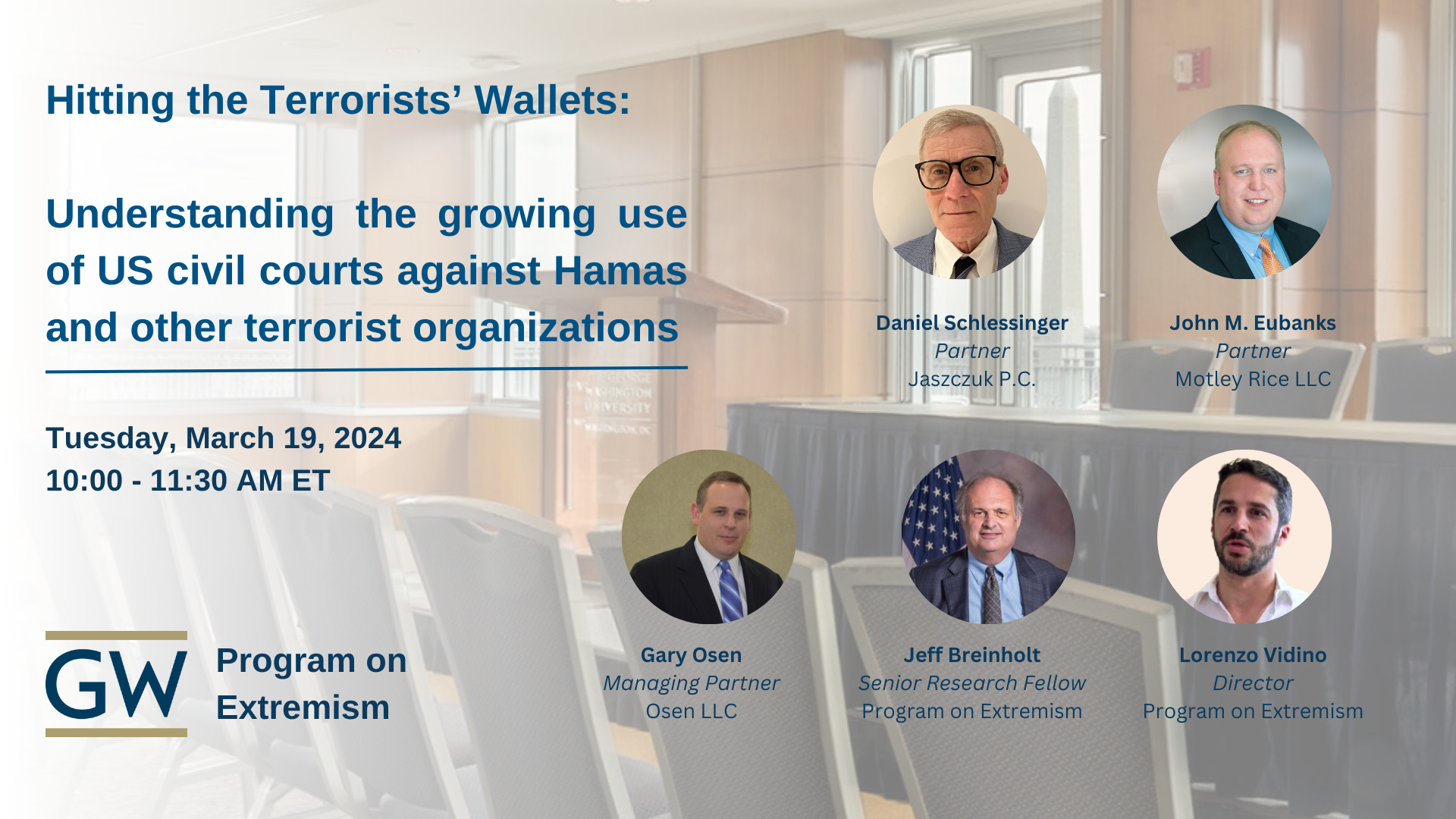Hitting the Terrorists’ Wallets: Understanding the growing use of US civil courts against Hamas and other terrorist organizations

In recent weeks, civil lawsuits have been filed in US courts against media outlets and cryptocurrency companies plaintiffs have accused of having enabled the attacks of October 7, 2023 in Israel. These are just the first of many lawsuits that are likely to be filed in relation to those tragic events and the last in a long series of cases brought against a multiplicity of actors under the Anti-Terrorism Act (18 U.S.C. §2333). Passed in 1992, the ATA permits American citizens to sue for damages for injuries due to international terrorism and has been used in more than 150 lawsuits since its enactment. It is a civil remedy that hits terrorists and their facilitators in ways that are different, but at times more effective, than traditional criminal proceedings. While ATA cases against Hamas have been filed in the past, substantially more will be filed in the near future for claims related to the October 7th attacks.
To discuss these dynamics, on March 19, 2024, at 10 am EST, the Program on Extremism hosted a virtual event hosting three practitioners with extensive experience in claims against Hamas and other terrorist organizations under the ATA.
After a short introduction by the Program on Extremism Director Lorenzo Vidino, the event was moderated by Program on Extremism Senior Research Fellow and recently retired US Department of Justice official Jeff Breinholt and it featured insights from:
John M. Eubanks, Partner at Motley Rice LLC
Gary Osen, Managing Partner at Osen LLC
Daniel Schlessinger, Partner at Jaszczuk P.C.
Breinholt opened the discussion by introducing the Anti-Terrorism Act (ATA), which aims to hold individuals civilly liable for aiding, financing, or conspiring with designated foreign terrorist organizations that harm U.S. nationals. Breinholt, who is the author of the Program on Extremism’s recently published report “Encyclopedia of ATA Cases,” noted that the 2016 Justice Against Sponsors of Terrorism Act (JASTA) amended the ATA to increase the scope of liability in civil claims relating to harm caused by international terrorism.
The first panelist of the event, Mr. Daniel Schlessinger, a partner at Jaszczuk P.C., spoke about the case of David Boim–the first American ever killed by Hamas in 1996. The Boim family sued defendants from organizations such as the Islamic Association for Palestine and the American Muslim Society under the civil liability provisions of the ATA, winning a $156 million judgment–which the organizations never paid. Schlessinger highlighted significant aspects of Judge Posner's en banc opinion, noting the ATA's scope in this litigation. Finally, Schlessinger gave an overview of the 2022 opinion denying motions to dismiss under Judge Feinerman.
The panel discussion continued with Mr. Gary Osen, managing partner at Osen LLC. Osen covered Linde v. Arab Bank, the first jury trial against a financial institution under the ATA. He began by discussing various Hamas leaders and operatives in Gaza who received transfers through Arab Bank from 2000 to 2002. Osen continued by speaking about challenges related to this case, which included gathering evidence and how courts approach ATA cases. Finally, Osen discussed the Justice Against Sponsors of Terrorism Act (JASTA) and its impact on civil terrorism cases. He noted that post-JASTA cases have narrowed liability in civil terrorism cases, explaining the Charitable and Profit Motive Loopholes. He claimed that JASTA has made it more difficult to prove the liability of individuals who aided, financed, or conspired with terrorist organizations that harmed US citizens under the jurisdiction of the ATA.
The event's final speaker was Mr. John Eubanks, a partner of Motley Rice, LLC. Eubanks spoke about U.S. civil cases against Mexican cartels whose members harmed American citizens. Eubanks cited a specific case of a group of U.S. citizens who drove into an area controlled by the Juarez cartel and were subsequently attacked by members of that cartel. Eubanks then opened with the argument that although Mexican cartels are not designated foreign terrorist organizations (FTOs), their actions can fall under the ATA’s definition of an act of terrorism against a US citizen. Finally, Eubanks closed by noting that the FSIA allows foreign states to be held liable for sponsored terrorist attacks in the U.S., as well as having their sovereign immunity lifted. However, judges in previous cases interpreted this matter in contradictory opinions, asserting that foreign states cannot be held liable. Legislation that could change this issue has not yet passed.

